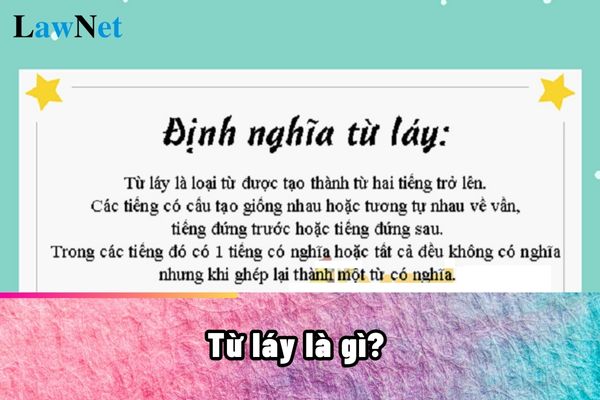What is a Vietnamese reduplicative word? When do students in Vietnam learn reduplicative words?
What is a Vietnamese reduplicative word? When do students in Vietnam learn reduplicative words?
- Reduplicative word is a rhetorical device in Vietnamese, created by repeating a part or the entire syllable of a root word or combining two words with similar initial sounds or rhymes to form a new word with an expressive nuance or to emphasize a meaning.
- Functions of reduplicative word:
+ Creating rhythm: reduplicative word makes sentences more rhythmic, flowing, and pleasant.
+ Enhancing imagery: reduplicative word helps the reader or listener visualize more vividly the objects or phenomena described.
+ Emphasizing meaning: reduplicative word helps to highlight characteristics or qualities of objects or phenomena.
+ Creating expressiveness: reduplicative word helps express emotions and attitudes of the speaker or writer.
- Types of reduplicative word:
+ Complete iteration: Repeating the entire syllable of the root word (e.g., lung linh, xinh xinh).
+ Partial iteration: Only repeating a part of the syllable of the root word (e.g., đo đỏ, xanh xanh).
+ Initial sound iteration: Two words in the compound have the same initial sound (e.g., long lanh, lấp lánh).
+ Rhyme iteration: Two words in the compound have the same rhyme (e.g., nao núng, le lói).
*Example:
Complete iteration: lung linh, xinh xinh, đo đỏ, xanh xanh
Partial iteration: lấp lánh, lung linh, le lói, nao núng
Initial sound iteration: long lanh, lấp lánh, đo đỏ, xanh xanh
Rhyme iteration: nao núng, le lói
Note: The information is for reference only./.
Additionally, reduplicative word is taught in the Vietnamese literature curriculum. According to the provisions of Section IV of the Vietnamese Literature Education Program issued with Circular 32/2018/TT-BGDDT, reduplicative word is a mandatory requirement in the curriculum of Grade 6 Literature:
VIETNAMESE LANGUAGE KNOWLEDGE
- Simple words and compound words, compound words and reduplicative word
- Polysemous words and homonyms
- The meanings of some common idioms
- The meanings of some common Sino-Vietnamese elements (e.g., bất, phi) and the meanings of words with those Sino-Vietnamese elements (e.g., bất công, bất đồng, phi nghĩa, phi lí)
- Main components of the sentence: expanding the main components of the sentence with phrases
- Adverbial phrases: characteristics, function of linking sentences
- Usage of semicolons (marking boundaries between components in a complex enumeration); quotation marks (indicating the interpretation of a term not in its usual sense)
Thus, reduplicative word is taught in the Grade 6 Vietnamese literature curriculum.

What is a Vietnamese reduplicative word? When do students in Vietnam learn reduplicative words? (Image from the Internet)
Who is responsible for the quality of education for grade 6 students in Vietnam?
According to Article 27 of the Regulations on lower secondary schools, upper secondary schools, and Schools with Multiple Educational Levels, issued with Circular 32/2020/TT-BGDDT, the duties of teachers are as follows:
- Perform tasks of organizing teaching and educational activities according to the school's educational plan and the specialized team's educational plan; manage students in educational activities organized by the school; participate in professional activities; be responsible for the quality and effectiveness of education.
- Cultivate ethics, uphold the spirit of responsibility, maintain the teacher's qualities, honor, and reputation; set an example for students; love, treat fairly, and respect the personality of students; protect the legitimate rights and interests of students; unite and help colleagues.
- Study and train to improve health, political literacy, professional expertise, innovate teaching and educational methods.
- Participate in professional training and development.
- Participate in local secondary education dissemination work.
- Fulfill civic duties, comply with laws and educational sector regulations, decisions of the principal; perform tasks assigned by the principal, and be inspected and evaluated by the principal and educational management levels.
- Coordinate with the Ho Chi Minh Young Pioneer Organization, the Ho Chi Minh Communist Youth Union, the Vietnam Youth Union, students' families, and related social organizations to organize educational activities.
- Perform other duties as prescribed by law.
Thus, based on the above provisions, teachers are responsible for the quality and effectiveness of education. Specifically, for Grade 6 students, the teacher of that class will be responsible.
Are grade 6 students in Vietnam allowed to receive information about their own studies?
According to Article 35 of Circular 32/2020/TT-BGDDT, the rights of students are as follows:
Rights of Students
1. To be equal in enjoying comprehensive education, to be guaranteed conditions regarding time, physical facilities, hygiene, and safety to study in class and self-study at home, to be provided with information about one's own study and training, to use equipment and means for school learning, cultural, and sports activities according to regulations.
2. To be respected and protected, treated equally and democratically, to have the right to appeal to the school and educational management levels about decisions concerning oneself; to have the right to transfer schools for legitimate reasons according to current regulations; to study at an earlier age, skip grades, study at an older age than the prescribed age according to Article 33 of this Regulation.
3. To participate in activities to develop talents in subjects, sports, and arts organized by the school, if eligible.
4. To receive scholarships or other allowances according to regulations for students entitled to social policies, students with difficult living conditions, and students with special abilities.
5. To transfer schools if eligible according to regulations; school transfer procedures are performed according to the regulations of the Minister of Education and Training.
6. To enjoy other rights as prescribed by law.
Thus, Grade 6 students have the right to receive information about their own studies and training.
Thus, referring to the regulation, Grade 6 students are entitled to be provided with information about their studies.

